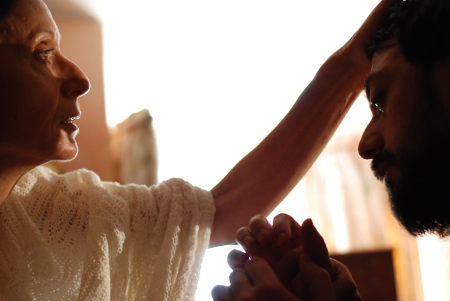DIRECTED BY: Jack James
FEATURING: Roxy Bugler, Kemal Yildirim, Jill Connick
PLOT: A grieving daughter buries her sorrow in a new relationship, but when her boyfriend’s mother summons him home, she confronts a malevolent force.

WHY IT WON’T MAKE THE LIST: Malady is a brutal, unforgiving look at both the rawness of grief and the depth of cruelty. The film explores these topics with shocking bluntness. However, the weirdness lies mostly in the telling, which deliberately challenges the audience in order to evoke the characters’ feelings.
COMMENTS: If Malady were a typical horror film, the moment when Holly (Bulger) takes her first step toward calamity would be a scene of heightened drama, possibly with foreboding music or a shock jump. But here, it’s the grating buzz of a vibrating cell phone. Banal as it seems, her new boyfriend greets the signal with dread. However, like the warning of a crotchety old man about the old cabin up the trail, Holly pushes the red flag aside, and there the trouble truly begins.
In that respect, Malady is a typical horror film, hitting all the beats of the tale of a girl who wanders into the woods only to find a monster lurking within. But writer-director James grafts these tropes onto an atypical examination of the debilitating impact of grief, so what would normally be attributable to inexplicable bubbleheadedness can here be ascribed to the devastating power of loss.
Malady is an uncompromisingly grim motion picture; it starts with the death of Holly’s mother, ensuring that our protagonist begins the tale wounded and psychically frayed. “Find love” is her mum’s final missive, but too devastated to engage with the world, she jumps into a relationship with Matthew (Yildirim), an emotional compatriot. Together, they hide away from the world, having joyless, desperate sex, managing the barest of conversation, and dreading the moment when they will have to re-connect to society. But the more time they spend together, the more Holly begins to feel like this could be the love she seeks. She starts fumbling about looking for a trace of normal, which leads inexorably to that fateful phone call.
So sparse is the dialogue in Malady that it could barely fill out a long poem. (It’s roughly ten minutes before our heroine utters a word). In the film’s second half, the bulk of that dialogue is delivered by Matthew’s dying mother (Connick), a monstrous figure who speaks only if she can hurt someone in the process and who is self-evidently the cause of her son’s wrecked ego. Her unerring knack for targeting her hate, combined with purposely claustrophobic camerawork, off-kilter editing, and a buzzing soundtrack, leaves the viewer feeling much like Holly: uncomfortable and unmoored.
James has absolute control over the vision presented here, and he has created something impressionistic, channeling raw feeling through cinematic technique. (In addition to writing and directing, he also serves as cinematographer, editor, sound designer and editor, colorist, and producer). The film is a rush of images, sometimes unfocused, frequently confusing in their order and context. Malady is about deeply damaged people, and James has crafted a piece that reflects their troubled, fraught mindset, even if it doesn’t offer them much hope.
Malady is expertly made, superbly acted (especially by Bulger, who deserves a film where she can smile), and so emotionally raw that it’s nigh impossible to contemplate a repeat viewing. There’s cleverness in the application of horror-film logic to the overpowering effects of grief, depression, and abuse, and it extends to the movie’s climax: having endured a hell that would be absurd by conventional standards, Holly is moved to act in a manner that would earn her cheers if she was vanquishing a supernatural monster or a relentless serial killer. However, in this setting, the victory is hollow, and the movie’s final message seems to be that the real Big Bad here—painful and devastating loss—can never be defeated. Malady is a horror movie where nothing is metaphor, and the Final Girl is destined to lose.
WHAT THE CRITICS SAY: